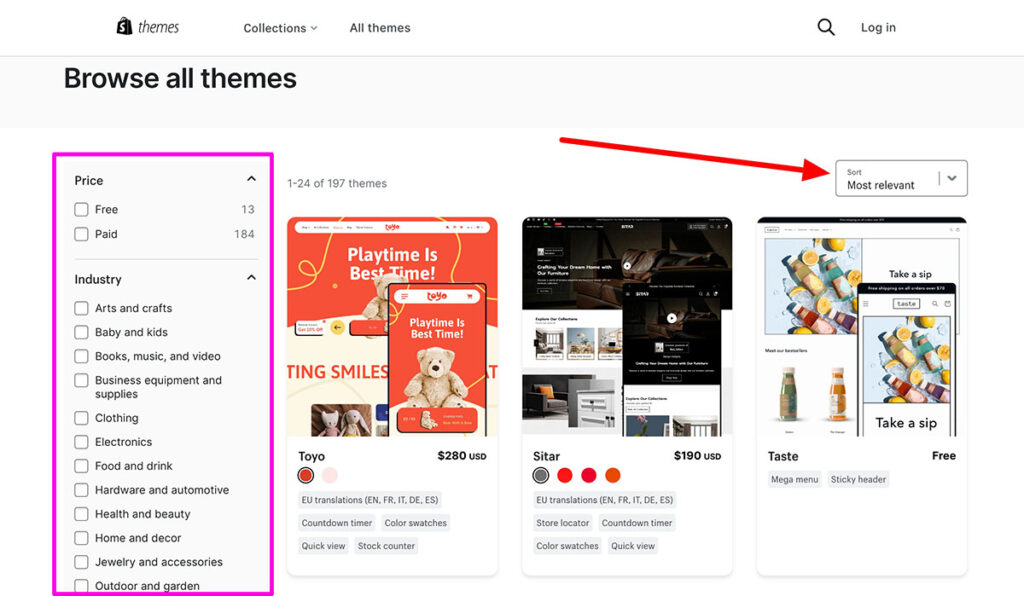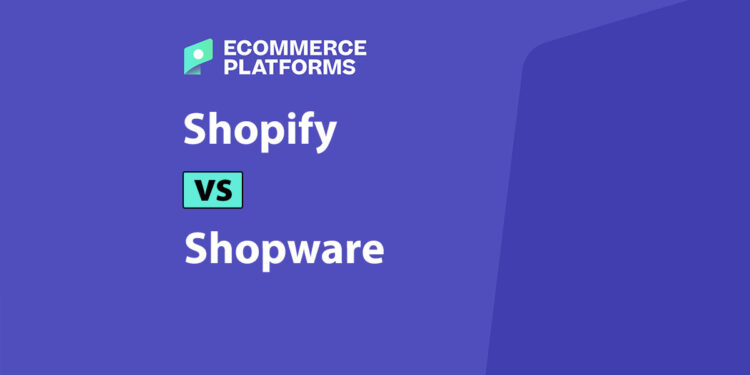Shopify vs Shopware: Which do you have to select? I’ve mentioned many occasions that Shopify is my favourite ecommerce platform, and that’s nonetheless true. It’s a unbelievable answer for omnichannel promoting, and it’s some of the versatile platforms on the market, due to its complete app retailer.
Nevertheless, Shopware is a fierce contender. After testing the platform, I used to be extraordinarily impressed by the unbelievable themes, the flexibility supplied, and even Shopware’s new AI and spatial instruments.
Right here, I’ll stroll you thru all the things you’ll want to find out about each platforms, to make sure you may make the fitting determination for your corporation.
Fast Verdict, Professionals and Cons
It’s a tricky name, however I’d nonetheless give Shopify the trophy right here for a few causes. First, Shopware is very costly, because it’s meant for corporations with ultra-advanced ecommerce wants. The cutting-edge AI and 3D capabilities are superb, however you’ll pay rather a lot for them.
Secondly, I discover Shopify a lot simpler to make use of general. You really want a devoted IT workforce to grasp Shopware.
Shopify Professionals and Cons
Professionals 👍
- Omnichannel gross sales with an included POS
- Simple-to-use platform with a smaller studying curve
- A lot of flexibility through apps and integrations
- Nicely-designed themes, and handy modifying instruments
- Built-in AI options and 3D capabilities
- Glorious enterprise and stock administration
- Cheaper pricing than Shopware.
Cons 👎
- Transaction charges for third-party gateways
- Fewer distinctive options
Shopware Professionals and Cons
Professionals 👍
- Superior AI and spatial options
- Glorious buyer expertise and advertising and marketing
- Nice stock and order administration
- Enhanced workflow automation
- Omnichannel and headless commerce
- B2B and B2C promoting
- Integrations, apps-and add-ons
Cons 👎
- Steeper studying curve
- Costlier pricing
Shopify vs Shopware: Pricing and Charges
I’ll begin by wanting on the pricing of each platforms, as that’s one of many largest areas the place the variations between Shopify and Shopware stand out. Whereas Shopify does help enterprise-level prospects with Shopify Plus, and presents loads of the identical options as Shopware in that plan (together with headless commerce), it helps smaller companies too.
Shopify Pricing
Shopify presents a wide range of fixed-cost month-to-month subscription plans. When you don’t want a full web site, you possibly can select the Starter plan for $5 monthly, though I’d actually solely advocate that to influencers promoting merch on-line.
The central plans begin at $39 monthly for Shopify Primary, $105 monthly for Shopify, and $399 monthly for Shopify Superior. The extra you spend, the extra workers accounts and options you’ll get. Shopify Superior even unlocks further options inside Shopify POS.


Shopify Plus, which begins at $2,300 monthly, permits corporations to unlock loads of the additional options they may discover on Shopware, reminiscent of headless commerce, superior automation, and extra AI powered instruments. Notably, you’ll have to pay transaction charges on Shopify too, should you select to make use of something apart from Shopify Funds.
MORE: Shopify Pricing Guide
Shopware Pricing
Shopware completely targets bigger corporations with distinctive ecommerce necessities. The platform’s most cost-effective plan, “Rise”, begins at $600 monthly, relying on the performance you want. Though that is over 10 occasions the worth of Shopify’s most cost-effective plan, it’s price noting you get much more 3D capabilities, AI instruments, and automation choices.
Each of Shopware’s different plans are “customized priced”. The “Evolve” plan consists of superior CX options and complete B2C and B2B capabilities. The “Past” plan consists of all of Shopware’s distinctive options, in addition to superior buyer help.
I couldn’t discover loads of details about transaction charges with Shopware, so which may be one thing you’ll need to ask about if you contact its gross sales workforce.
MORE: Shopware Review
Core Options Winner: Shopify
Though Shopware is a much more superior ecommerce platform general, it does have loads of options in widespread with Shopify, together with help for omnichannel promoting, automated workflows, and headless commerce, although many of the superior options are locked to Shopify Plus.
Web site Design and Themes
I’ve all the time been an enormous fan of Shopify’s themes. Each the free and premium choices look unbelievable, they usually’re all the time cellular responsive, and designed to load pages rapidly. The editor you’ll use on Shopify may not be as simple as those on some different platforms, like Wix, nevertheless it’s fairly easy to begin customizing your retailer.


You additionally get a built-in weblog (coming quickly on Shopware), in addition to web optimization options baked into your retailer constructing answer. Shopware additionally has unbelievable themes, that appear to be professionally designed to boost your model’s look, no matter what your area of interest or business is perhaps.
The visible web page builder is fairly simple to make use of, with drag-and-drop performance. Nevertheless, if you wish to make extra granular adjustments to your retailer, you would possibly want to think about working with a developer or designer. The 3D or “spatial” capabilities on Shopware are superb, however they undoubtedly require much more technical data.
These assist you to create augmented actuality experiences, 3D photographs of merchandise, scenes, and immersive components for metaverse procuring.
Gross sales Channels and Ecommerce
As talked about above, each Shopware and Shopify help omnichannel promoting. They provide entry to limitless gross sales channels, permitting you to promote on social media, marketplaces, and even by way of brick-and-mortar areas.
Apparently, Shopify has its personal POS answer constructed into the platform (the Lite model is included on most plans). Shopware has an built-in POS too, nevertheless it’s powered by Pickware.
I like the truth that each of those platforms assist you to create localized experiences for worldwide prospects, with instantaneous language translation. Additionally they each help B2B capabilities, however you’ll want a Shopify Plus plan to entry this operate with Shopify, and a “customized priced” plan from Shopware to unlock something past “gross/internet worth show”.
Enterprise Administration and Integrations
Shopware and Shopify each provide wonderful instruments that can assist you handle all types of enterprise capabilities. I believe Shopware’s buyer administration options are just a little extra spectacular, with built-in cross-selling and social procuring capabilities. You’ll want integrations to entry these capabilities with Shopify, which might add to your month-to-month prices.
Stock and order administration on each platforms is fairly comparable. Nevertheless, Shopware permits you to promote digital merchandise with out the necessity for an app or add-on (That’s not the case with Shopify). Shopify’s stock administration instruments and transport instruments are just a little simpler to make use of in my view.
I additionally like the truth that Shopify makes it extraordinarily simple to combine with dropshipping and print on demand platforms. Nevertheless, Shopware does provide the possibility to permit prospects to “personalize” their merchandise with their title, or a picture.
Each corporations additionally provide computerized tax calculation, and transport calculation choices (relying on the plan you select). Additionally they each combine with a variety of third-party platforms. Shopify does have a neater to make use of app market, nonetheless, whereas Shopware requires you to take an API-first strategy to connecting your instruments.
Advertising, Reporting and Analytics
Shopify and Shopware each improve advertising and marketing campaigns in numerous methods. They each assist you to showcase product evaluations in your web site, host promotions, use present playing cards, and create voucher codes. Additionally they each help cross-selling and upselling, though you’ll want an app to make use of these options on Shopify, whereas it’s built-in on Shopware.
Each platforms are web optimization pleasant too, nonetheless, I believe Shopware does just a little extra to spice up your rankings, with wealthy snippets, canonical tags, and different distinctive options. I like Shopify’s built-in reporting instruments higher than the choices you get on Shopware, nonetheless.
With Shopify, you possibly can simply observe all the things from stock numbers, to buying developments and cashflow. With Shopware, you’ll have to rely just a little extra on add-ons and integrations to unlock in-depth customizable stories. On the plus aspect, some reporting instruments are free so as to add to your retailer, which implies at the very least you gained’t have further charges to fret about.
AI Capabilities
Right here’s the place Shopware actually has an edge over Shopify, at the very least for now. Shopify has been investing rather a lot in AI instruments in recent times, with it’s Shopify Magic answer, and Shopify Sidekick. With Magic, you possibly can create distinctive product pages, edit photographs, produce content material, and even generate FAQ pages.


With Sidekick, you’ll have entry to a handy bot that may information you thru the method of optimizing and bettering your retailer’s efficiency, or monitoring stock. Shopify is including extra AI options to its platform, however Shopware’s AI instruments are much more sturdy.
One of many core options you’ll get on all plans is the “AI Copilot”, which may classify prospects, create content material for procuring experiences, decide key phrases for photographs, create customized checkout messages, and a lot extra. Shopware additionally gives AI search capabilities, textual content to picture creation, AI-enhanced spatial encounters, and scene editors.
MORE: The Ultimate Guide to Shopify Magic
Buyer Assist
Lastly, Shopify wins once more within the realm of buyer help. Though it could possibly take some time for somebody to get again to you relying on a variety of things, you’ll be capable of attain out to the workforce through chat, e-mail, and even on the telephone on a 24/7 foundation.
There’s additionally a unbelievable on-line neighborhood, and Shopify creates loads of assets to information you thru constructing your retailer.
Shopware’s buyer help could be wonderful, nevertheless it’s not a 24/7 service. When you’re on the Rise plan, you’ll solely get help between 9am and 5pm, and it could possibly take as much as 8 hours to get a response. You additionally solely get e-mail help.
On extra superior plans, the hours the help workforce is offered will improve, however you’ll want the “Past” plan for full 24/7 service, telephone help, and private onboarding. On the plus aspect, there’s a neighborhood discussion board accessible, and loads of self-help assets.
Shopify vs Shopware: The Ultimate Verdict
General, Shopware is an extremely spectacular platform, excellent for corporations that need to construct distinctive and superior experiences for on-line prospects. It soars forward of Shopify by way of AI options, spatial capabilities, and highly effective buyer administration.
Nevertheless, Shopify is rather a lot simpler to make use of for newcomers, and presents extra reasonably priced plans to corporations that aren’t on the “Enterprise” stage but. It’s additionally a extra versatile platform in my view, making it simpler to scale and optimize your retailer over time.






